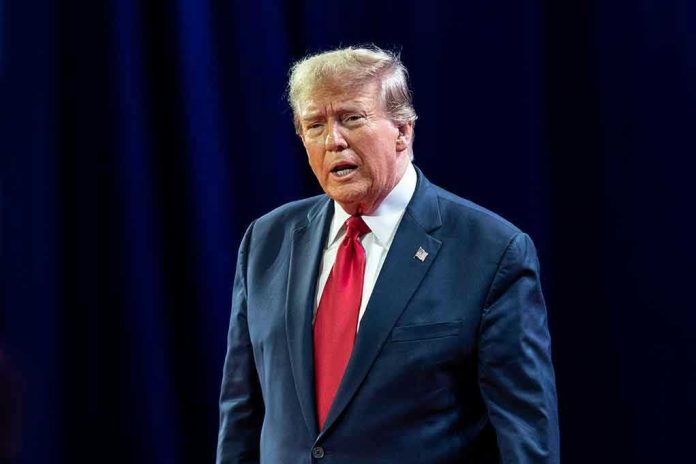
One man’s criminal downfall became a presidential lifeline, as George Santos walked free after less than three months in prison—because Donald Trump decided a loyal party operative deserved clemency, not justice.
Story Snapshot
- Donald Trump commuted George Santos’s federal fraud sentence, releasing him instantly from prison.
- The commutation triggered outrage across party lines, exposing sharp Republican divisions over accountability.
- Trump cited political loyalty and alleged mistreatment—not legal or humanitarian grounds—as justification.
- Santos now faces no further penalties, leaving victims uncompensated and questions swirling about political power and justice.
Trump’s Intervention Upends Justice for a Disgraced Congressman
George Santos’s transition from convicted fraudster to free man was not a slow burn—it was a political thunderclap. Just three months into an 87-month sentence for wire fraud and aggravated identity theft, the former congressman was whisked out of Fairton federal prison, his shackles removed by the stroke of President Trump’s pen. The justification was not remorse or rehabilitation, but alleged prison mistreatment and, more pointedly, Santos’s unwavering loyalty to the Republican Party. This was not your average exercise of presidential clemency powers; it was a raw display of executive authority, wielded for political reward rather than legal redress.
This executive action sent shockwaves through Washington, reverberating far beyond the prison gates. Members of Congress who had once voted to expel Santos now watched as the man they had condemned was elevated back into the spotlight, not by vindication, but by presidential favor. Critics across the spectrum seized on the speed and rationale of the commutation, calling it an unprecedented use of clemency as a tool for partisan loyalty, not justice. For many, the message was clear: in today’s political landscape, the scales of justice can be tipped if you play your cards—and your party allegiance—right.
The Road to Conviction: Lies, Scandal, and a Divided Party
Santos’s rise and fall was spectacular, even by the standards of modern political scandal. Elected in 2022, he brought with him a resume riddled with fabrications about his education, work history, and even personal identity. Media investigations and a damning House Ethics Committee report peeled back the layers of deceit, culminating in his expulsion from Congress in December 2023. Federal prosecutors moved quickly, charging him with 23 counts, including wire fraud, identity theft, and theft of public funds. A plea deal followed, but even as Santos admitted guilt, he maintained a defiant public persona, blaming the system and seeking sympathy for alleged mistreatment in custody. Through it all, the Republican Party fractured—some demanding accountability, others circling the wagons to protect one of their own.
When Trump intervened, the internal GOP rift split wide open. Representatives like Marjorie Taylor Greene and Lauren Boebert applauded the move as a victory against “political persecution,” casting Santos as a casualty of partisan lawfare. Others, especially those who had supported his expulsion, blasted the commutation as a betrayal of conservative values and a dangerous precedent. In the court of public opinion, Trump’s decision was less about redemption and more about rewarding those who show fealty to his vision of the party.
Winners, Losers, and the Erosion of Accountability
Santos’s release brought immediate consequences for the people and institutions left in his wake. Victims—campaign donors, a disabled veteran, and others defrauded by his schemes—found themselves without restitution or closure. The legal system, which had delivered a stiff sentence to signal the seriousness of political corruption, was overridden by the White House. Prosecutors and judges alike saw years of work nullified in a thirty-second social media statement from Trump. Congressional Republicans, already grappling with questions of ethics and loyalty, now face intensified scrutiny and internal discord.
Beyond the immediate fallout, the long-term implications for American justice and democracy are profound. Legal experts warn that such a swift, unconditional commutation—justified on explicit partisan grounds—undermines the deterrent effect of anti-corruption laws and could embolden future offenders. Political scientists point to the risk of increasing executive overreach, where presidential power is wielded less as a check and balance, and more as a blunt instrument to reward allies and punish enemies. For the public, each episode like this further erodes confidence in the fairness of the system, deepening cynicism and polarization.
Expert Analysis: Setting a Precedent for Partisan Clemency
Legal scholars and watchdog groups have called the Santos commutation extraordinary, not just for its timing but for its openly political rationale. Unlike most presidential clemency actions, which typically cite humanitarian concerns, doubts about guilt, or evidence of rehabilitation, Trump’s statement fixated on Santos’s value to the Republican cause and his alleged suffering behind bars. This explicit linkage of clemency to political loyalty, experts say, represents a sharp break from past practice and sets a precedent that could ripple through future administrations.
Within the Republican Party, this episode has crystallized a broader battle over the meaning of loyalty and accountability. Supporters frame Trump’s intervention as a necessary counterweight to what they see as a weaponized justice system. Critics argue that it rewards criminality and corrodes the party’s moral authority. For voters, the spectacle of a disgraced lawmaker walking free—without restitution, without remorse, and without consequence—may become a defining symbol of this era’s fractured politics and the shifting boundaries of presidential power.
Sources:
LA Times: Trump commutes former Rep. George Santos’ sentence
6abc/ABC News: George Santos released from South Jersey prison after sentence commuted by Trump



